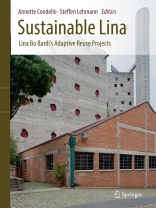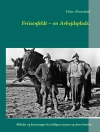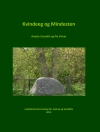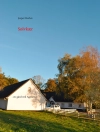This essential book unravels the link between regional cultures, adaptive reuse of existing buildings and sustainability. It concentrates on the social dimensions relating to Brazilian architect Lina Bo Bardi’s late adaptive reuse projects and works from the 1960s to the early 1990s, interpreting her themes, technical sources and design strategies of the creation of luxury as sustainability.The edited book charts how Lina Bo Bardi “invented” her own version of sustainability, introduced this concept through her landscape and adaptive reuse designs and through ideas about cross-cultures in Brazil. The book offers a critical reflection, exploration and demonstration of the importance of adaptive reuse in the landscape and related themes for researchers and provides researchers and students new material on sustainability for further study.
In the context of the plurality of revisions of Lina Bo Bardi’s work, this book brings about a refreshed interpretation of her integrativeapproach to adaptive reuse of buildings and landscapes as a significant contribution to the sustainability debate. It offers new insights into the construction of discourses about sustainability from the perspective of one of the key architects in the period to operate in the interface between modernity and tradition.
– Dr Fabiano Lemes de Oliveira , Senior Lecturer, University of Portsmouth (UK)
Adaptability is one of the most important words in sustainable architecture today. From this perspective, this book looks at the work of a master of Brazilian modernism with lessons to be learnt on how to qualify indoor and outdoor spaces in social, environmental and architectural terms. Adaptive strategies as those seen throughout the work of Bo Bardi are key instrument/tools/concept to sustainable buildings and cities.
− Professor Joana Carla Soares Goncalves, FAU, University of Sao Paulo (Brazil)
The year 2015 marked the centenary of Lina Bo Bardi. This book is looking at Bardi’s work through the perspective of adaptive reuse. Bringing together specialists on sustainability with specialists of Lina’s work, the book generates an interesting new layer of discussion on the work of an architect that was never shy of controversy.
− Associate Professor Fernando Luiz Lara , University of Texas at Austin (USA)
This collection of essays makes a very important and engaging contribution to suggest that to take Lina as an inspiration is to deal with her contradictions and to evaluate the stakes of what she struggled with in a 21st century world. What the authors gathered here and have laid out is a very timely invitation to discern “Lessons from Lina” in relationship to today’s pressing issues of architecture and environment, sustainability, recycling, and developing an ethical design position in a world of diminishing resources and escalating challenges.
-Prof Barry Bergdoll, Columbia University and Mo MA, New York (USA)
The book features a Foreword by Barry Bergdoll.
Winner of the Curtin University Humanities Research Award 2017 for Best Book of the Year (Oct. 2017). Here the judges’ appraisal:
“An elegantly conceptualised and carefully crafted volume that represents the work of the twentieth century Brazilian architect Lina Bo Bardi through the lens of urgent contemporary questions of sustainability, adaptive re-use and ethical design. The book brings together a multidisciplinary and international collection of authors and addresses a global readership. It is beautifully presented and intelligently edited.” (Jury, Book Award 2017)
Winner of the Curtin University Humanities Research Award 2017 for Best Chapter of the Year (Sept. 2017): Annette Condello. Chapter 3 “Salvaging the Site’s Luxuriance: Lina Bo Bardi – Landscape Architect.” Here the judges appraisal:
“A richly textured investigation of Lina Bo Bardi, a complex, fascinating and important Italian-born Brazilian architect, designer and co-founder of the magazine Habitat. […] This chapter is a thoughtful and respectful but also critical piece, combining thorough research with deft analysis and carefully selected images, and the publication has been highly recommended by leading academics and curators.” (Jury, Book Award 2017)
Зміст
Preface.- Sustainable Lina, an Introduction.- Keeping the Existing: Lina Bo Bardi’s Up-cycling and Urban Renewal Strategies.- Salvaging the Site’s Luxuriance: Lina Bo Bardi – Landscape Architect.- Recycling and Restoration: Adding New Meanings to Historical Buildings Through Minimal Interventions. Appendix: A Conversation with the Authors: The Lina Bo Bardi Effect.- Lina Bo Bardi Timeline in Brazil (1946-1992).
Про автора
Dr Annette Condello, Ph D, MArch, is a lecturer teaching history, culture and design in the Department of Architecture at Curtin University, Australia.
Dr Steffen Lehmann, Ph D, AADip, is Professor of Sustainable Architecture, leading the priority research theme of Sustainable Cities within the Faculty of Creative and Cultural Industries at the University of Portsmouth, United Kingdom.












